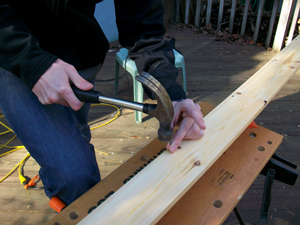Just like a house is built with lumber, screws, and nails, sentences are built with words, phrases, and clauses. Take a look at the example below.
| SENTENCE | ||
| When I swung the hammer | without aiming properly, | I missed the nail and banged my thumb. |
| PHRASE | ||
| SUBORDINATE CLAUSE | MAIN CLAUSE | |
You might want to quickly review the difference between phrases and clauses. A phrase is a group of words that, unlike a clause, does not have both a subject and a verb, and it does not express a complete thought. In the example above, you can see that the phrase without aiming properly does not have a subject and does not make sense by itself.

Source: Hammering Nails, Baminnick, Wikimedia
Returning to the example above, you might even be asking yourself, “What are clauses again?” Clauses are also groups of words, but they do contain subjects and verbs.
One type of clause can express a complete thought. It is called a main or independent clause because it can stand alone. See how the main clause I missed the nail and banged my thumb in the example above has a subject (I) and two verbs (missed and banged) and makes sense by itself?
Another type of clause is called a subordinate or dependent clause because it does not express a complete thought and cannot stand alone. In the example above, When I swung the hammer without aiming properly is the dependent clause because even though it has a subject (I) and a verb (swung), it does not make sense by itself.
If someone came up to you and said, “When I swung the hammer without aiming properly,” you would probably respond, “Then what happened?” You would have a question because the group of words is not a complete thought and is not a complete sentence. Presenting a subordinate clause by itself is similar to building a tree house with a piece of splintered wood; neither are solid on their own. The subordinate clause needs a main or independent clause to form a complete thought and a complete sentence.
Why is knowing the difference between main and subordinate clauses a big deal? It is crucial in your writing to avoid presenting subordinate clauses by themselves for two reasons: 1) They can weaken the message you are trying to convey, and 2) they tend to confuse your readers. How can you identify subordinate clauses? Subordinate clauses begin with subordinating conjunctions or relative pronouns like the ones in the charts below. Find the subordinating conjunction or relative pronoun, and you likely have a subordinate clause.
| A few examples of subordinating conjunctions |
|---|
| because, after, when, even though, however, although, besides, since, unless, if, until, before, as |
| Relative pronouns |
|---|
| who, whom, whose, whoever, whomever, whosever, that, which, whichever |
Let’s see if you can identify main and subordinate clauses by answering the following questions.
